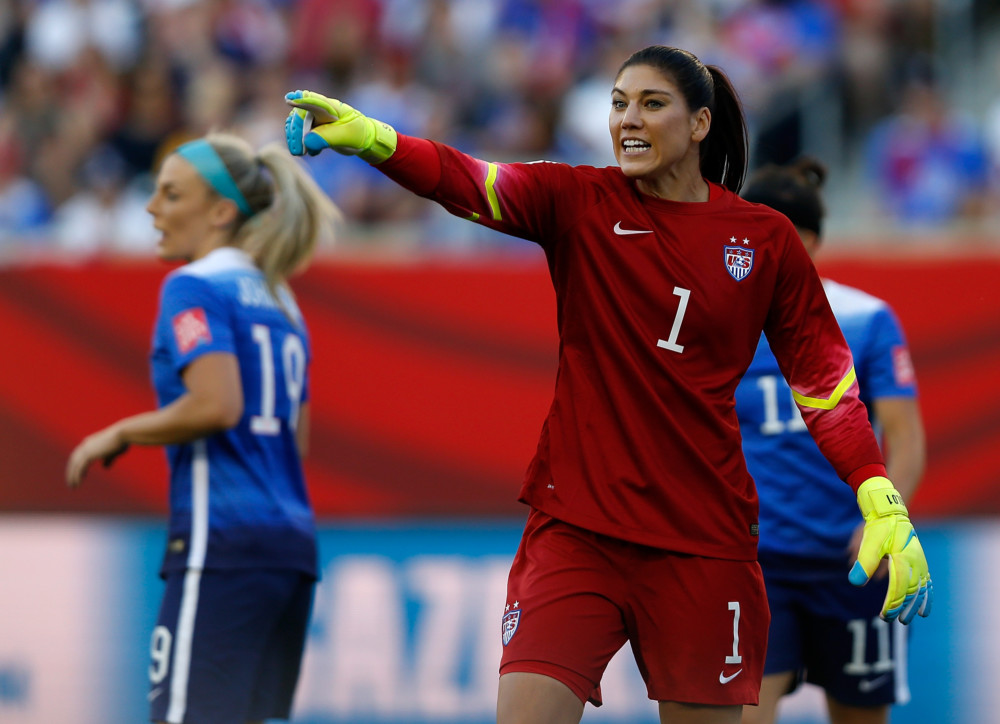By John Spina
Daily Times-Call, Longmont, Colo.
WWR Article Summary (tl;dr) When the U.S. Women’s team won the World Cup in 2015, Hope Solo played in 24 games and was awarded the Golden Gloves as the tournament’s best goalie. She was paid $40,000 less than Tim Howard, the U.S. men’s goalie. The men’s team was eliminated from the 2014 Men’s World Cup in the Round of 16, playing in only eight games.
Colorado
When the U.S. Soccer Federation fired Hope Solo, a former goalie for the U.S. women’s World Cup championship team and two gold medal-winning teams, it said it was because she called the Swedish team “a bunch of cowards” during the 2016 Olympics.
But Solo said she’s pretty sure it was because of her outspoken advocacy for equal pay.
“I was a thorn in their side and they thought by removing me the fight would be gone,” she said Friday during her appearance at the University of Colorado Boulder’s Conference on World Affairs.
“Little did they know by firing me I became unencumbered. I no longer had to be politically correct for the Olympic Committee or my sponsors and I could finally speak openly and honestly about how the federation treated women.”
Solo became the first athlete to sue their employer for discrimination under the Equal Pay Act. At the same time, she announced her candidacy for president of the federation she was suing.
“I didn’t run for (president of) U.S. Soccer because I thought I was going to win, I ran because the truth needed to get out there,” she said. “The history and culture within U.S. Soccer is male chauvinism. The federation wants the women to be successful, but not too successful. They want to keep us happy so that we don’t ask for more, but still don’t want to abide by federal law.”
The women’s team fought for fair pay while negotiating new collective bargaining agreements, filed complaints with the Equal Employment Opportunity Commission, and threatened to go on strike.
But each time the multi-million dollar organization would bully the team into submission with an army of lawyers and intimidation tactics, including threatening to take away their health insurance, she said.
Solo’s case is gaining momentum — 28 members of the current women’s player pool filed a lawsuit in U.S. District Court in Los Angeles under the Equal Pay Act and Title VII of the Civil Rights Act, according to Bloomberg. The lawsuit, which seeks class-action status, was filed March 8, which was International Women’s Day.
When the U.S. Women’s team won the World Cup in 2015, Solo played in 24 games and was awarded the Golden Gloves as the tournament’s best goalie. She was paid $40,000 less than Tim Howard, the U.S. men’s goalie. The men’s team was eliminated from the 2014 Men’s World Cup in the Round of 16, playing in only eight games.
Many have argued the lopsided pay scale — with women sometimes being four times less than a man — is a result of the revenue generated by each team.
However, according to court documents filed on March 8, following the women’s World Cup victory in 2015, which amassed the largest audience for a soccer game in U.S. history, women’s teams have generated more revenue for the U.S. Soccer Federation than men’s.
Solo’s outspoken demands for equal pay have come at a cost. She lost her dream job playing for U.
buy udenafil online gilbertroaddental.com/wp-content/themes/twentyseventeen/inc/en/udenafil.html no prescription
S. Soccer, had to cut ties with a lot of colleagues and has been ridiculed in the public eye.
Nevertheless, she said she won’t stop.
“I’ve always prided myself on standing up for what I believe in,” she said. “And I’ll tell you one thing right now, I don’t care if they offer me a ton of money for a settlement, I will not settle because the only way things change is by changing the course of history and there has to be a court case that actually does that.”
For those in the audience, especially young women, Solo’s story was inspiring.
“It made me proud to be a female athlete,” said Brin Malloy, a sophomore rugby player at CU. “It reminded me that you have to keep fighting for what you believe in every day, even if you’re down.”














































































































































































































































































































































































